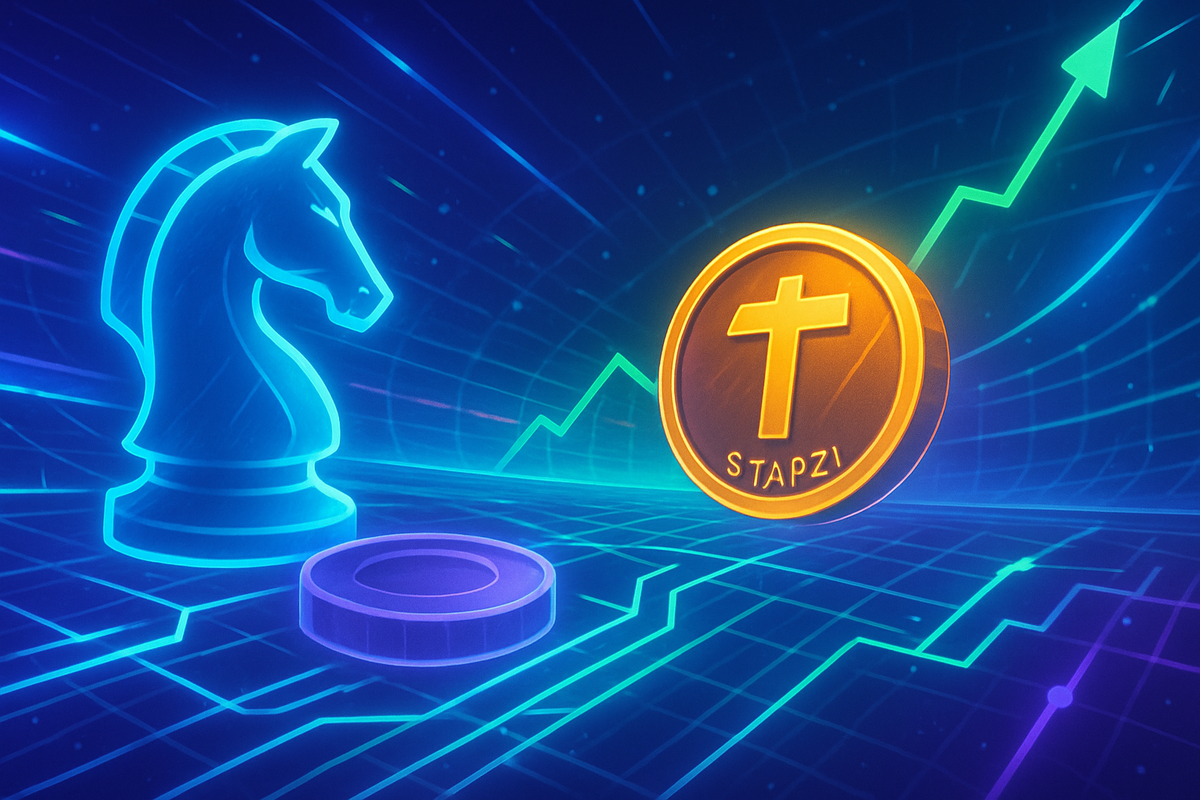
As the financial markets continually seek the next big disruption, a new cryptocurrency project, Tapzi, is rapidly gaining attention as a potentially transformative force in the burgeoning Web3 gaming sector for 2025. With its innovative "Skill-to-Earn" model and a robust ecosystem designed for sustainability, Tapzi is poised to address critical shortcomings of traditional GameFi, offering a compelling investment opportunity even for those with as little as $100. Its strong presale performance and optimistic analyst projections suggest it could redefine how players engage with and earn from decentralized gaming.
Tapzi's immediate implication is its challenge to the prevailing "play-to-earn" (P2E) paradigm, which has often been criticized for unsustainable tokenomics and susceptibility to bot exploitation. By shifting the focus to genuine player skill and competitive integrity, Tapzi aims to cultivate a more stable and engaging environment, attracting a broader base of gamers and investors alike. This strategic pivot could catalyze a new wave of growth and innovation within the Web3 gaming landscape, drawing significant capital and talent towards skill-based decentralized applications.
Unpacking Tapzi's Disruptive Model and Market Traction
Tapzi distinguishes itself through a suite of unique features meticulously crafted to foster a sustainable and engaging Web3 gaming experience. At its core is the Skill-to-Earn (S2E) model, where players stake $TAPZI tokens to compete in real-time Player-vs-Player (PvP) games such as Chess, Checkers, and Tic Tac Toe. Unlike P2E, which often relies on luck or inflationary token emissions, S2E rewards winners directly from the staked prize pool, creating a transparent and self-sustaining economy. This model, combined with ELO-based matchmaking and on-chain verification, ensures fair play and significantly mitigates cheating concerns, a common vulnerability in many online gaming platforms.
Beyond its gaming ecosystem, Tapzi functions as a decentralized Web3 gaming platform and launchpad built on the BNB Smart Chain (BNB-USD). It provides Software Development Kits (SDKs) and staking modules, empowering indie game developers to publish new skill-based games and leverage Tapzi's growing community. This developer-centric approach is crucial for scaling the ecosystem, ensuring a continuous influx of new content and maintaining player engagement. The platform also prioritizes frictionless onboarding with web and mobile-first access, gasless gameplay, and a free-to-play mode, making it accessible to casual gamers and potentially converting them into long-term participants.
The project's strategic positioning is underscored by its sustainable and deflationary tokenomics. The $TAPZI token has a fixed supply of 5 billion, designed to ensure scarcity and prevent inflation, a stark contrast to many P2E tokens that have suffered from hyperinflation. With a structured distribution for presale, liquidity, treasury, development, marketing, and team, along with vesting schedules, the incentives are aligned for long-term growth. Tapzi's presale has already demonstrated significant momentum, being hailed by some as the "best crypto presale of 2025," having sold over 55 million tokens in less than a month and being approximately 40% complete. This strong investor interest ahead of its official listing signals robust confidence in its potential.
Shifting Tides: Potential Winners and Losers in the Wake of Tapzi
The emergence of Tapzi and its Skill-to-Earn model could significantly re-align the competitive landscape within the GameFi and broader cryptocurrency sectors. Traditional GameFi projects that rely heavily on speculative tokenomics, high entry barriers, or luck-based gameplay may find themselves struggling to retain users and attract new investment. As players seek more engaging and fair earning opportunities, projects unable to adapt to a skill-centric, sustainable model could see their token values diminish and user bases decline. This includes many early P2E games that have faced challenges with token inflation and bot activity.
Conversely, developers and studios focused on competitive, skill-based gaming stand to be significant winners. Tapzi's platform as a launchpad offers a fertile ground for indie developers to bring their creations to a dedicated audience, bypassing the complexities of building their own blockchain infrastructure and community from scratch. This could foster a vibrant ecosystem of innovative, high-quality games, attracting both players and further development talent. Furthermore, existing blockchain networks that prioritize scalability, low transaction costs, and developer-friendly tools, such as the BNB Smart Chain (BNB-USD) where Tapzi is built, could also benefit from increased activity and transaction volume as Tapzi's ecosystem expands.
For investors, Tapzi presents a unique opportunity, particularly for those looking to enter the crypto market with a modest capital. With a presale price of $0.0035 per token, a $100 investment could secure approximately 28,571 $TAPZI tokens. The anticipated launch price of $0.01 immediately after presale suggests a potential gain of nearly 200% for early participants. This accessibility, coupled with projections of significant long-term growth, positions Tapzi as an attractive option for small and mid-level investors seeking substantial early-entry upside in the rapidly expanding Web3 gaming market, which is projected to reach $124 billion by 2032.
Broader Significance: Tapzi in the Evolving Digital Economy
Tapzi's innovative approach is not merely a niche development; it represents a significant evolutionary step within the broader Web3 gaming and digital asset landscape. Its emphasis on skill and sustainable economics addresses a fundamental critique of many early blockchain-based games, positioning it as a potential blueprint for future development. This aligns with broader industry trends favoring utility-driven tokens and genuine user engagement over speculative hype. The success of Tapzi could compel other GameFi projects to re-evaluate their models, driving a more mature and resilient ecosystem across the board.
The ripple effects could extend beyond GameFi, influencing how other decentralized applications (dApps) approach user incentivization and community building. By demonstrating a viable model for rewarding skill, Tapzi could inspire new forms of "work-to-earn" or "create-to-earn" platforms that prioritize merit and genuine contribution. Regulatory bodies, while still grappling with the classification of digital assets, may also find Tapzi's transparent, skill-based model easier to understand and potentially regulate compared to purely speculative or luck-based tokens, though the decentralized nature of crypto still presents challenges.
Historically, the cryptocurrency market has seen cycles of innovation, with projects that solve real-world problems or introduce sustainable economic models often achieving long-term success. Tapzi's focus on addressing the sustainability issues of P2E games draws parallels to early decentralized finance (DeFi) protocols that provided genuine utility beyond mere speculation. Its strategic timing, launching during a period of market volatility, allows it to build infrastructure and community, potentially positioning it for exponential growth when the next bull run inevitably occurs, much like how successful projects in previous bear markets have laid the groundwork for future expansion.
What Comes Next: Navigating Tapzi's Path Forward
In the short term, all eyes will be on Tapzi's successful completion of its presale and its official listing on exchanges. The transition from presale to public trading will be a critical moment, validating initial investor confidence and providing the first real test of its market liquidity and price stability. A smooth launch and sustained trading volume will be essential for building momentum and attracting a wider investor base. Continued progress in onboarding indie game developers and expanding the library of skill-based games will also be crucial for demonstrating the platform's utility and fostering a vibrant ecosystem.
Looking further ahead, the long-term success of Tapzi hinges on its ability to scale its user base and developer community. Strategic partnerships with established gaming studios, esports organizations, and even traditional tech companies could significantly accelerate its adoption. The development of new features, such as advanced tournament modes, NFT integrations for in-game assets, and enhanced social functionalities, will be vital for maintaining player retention and expanding revenue streams. Potential strategic pivots might include exploring cross-chain compatibility or integrating with broader metaverse initiatives, further extending its reach and utility.
Market opportunities for Tapzi could emerge from the growing mainstream acceptance of Web3 technologies and the increasing demand for engaging, fair, and rewarding digital experiences. Challenges will undoubtedly include intense competition from other GameFi projects, evolving regulatory landscapes, and the inherent volatility of the cryptocurrency market. Potential scenarios range from Tapzi becoming a dominant force in skill-based Web3 gaming, attracting millions of users and developers, to a more modest but stable growth as a niche platform. The most optimistic outcomes envision Tapzi reaching price targets of $0.50 or even $1 per token within its first year, representing substantial returns from its presale price, driven by strong adoption and increasing utility.
Comprehensive Wrap-Up: Tapzi's Lasting Impact on the Market
Tapzi represents a compelling evolution within the Web3 gaming sector, offering a refreshing alternative to the often-criticized "play-to-earn" model. Its "Skill-to-Earn" approach, coupled with sustainable tokenomics, a developer-friendly launchpad, and a focus on frictionless user experience, positions it as a significant contender for 2025 and beyond. The strong presale performance and optimistic analyst projections underscore the market's appetite for innovative, utility-driven crypto projects that prioritize long-term sustainability and genuine player engagement.
Moving forward, the market will closely assess Tapzi's ability to execute its roadmap, scale its ecosystem, and maintain its competitive edge. Investors should watch for key milestones such as exchange listings, the launch of new games on its platform, and the growth of its active user base. The project's success could have a lasting impact by setting a new standard for GameFi, encouraging a shift towards more skill-centric and economically sustainable models across the industry. For those seeking exposure to the cutting edge of decentralized gaming with an accessible entry point, Tapzi offers a noteworthy opportunity.
This content is intended for informational purposes only and is not financial advice.





